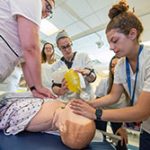Health professions or health care professions is a program of study that prepares students to become medical or wellness professionals.
 Dental Hygiene
Dental HygieneStudents interested in oral hygiene can study dental hygiene to become a registered dental hygienist.
 Diagnostic Medical Sonography
Diagnostic Medical SonographyStudents interested in sonography can study diagnostic medical sonography to become a registered professional in the field.
 Health Science
Health ScienceA post certification course of study to earn an associate’s degree for those individuals who have received education in a hospital sponsored programs
 Medical Office Assistant
Medical Office AssistantStudents interested in administrative, clinical, and management duties in healthcare can be trained in medical office duties to become a certified medical assistant.
 Nursing
NursingStudents interested in nursing can pursue training either as a day or evening student to become a registered nurse.
 Paramedic Science
Paramedic ScienceStudents interested in providing emergency life support to patients in the pre-hospital environment can study to become licensed EMT’s and paramedics.
 Radiation Therapy
Radiation TherapyStudents who are registered or registry-eligible radiologic technologists can study radiation therapy to help treat cancer to become certified in the field.
 Radiography
RadiographyStudents interested in the medical imaging profession can study radiography to become certified radiologists in the field.
 Respiratory Care
Respiratory CareStudents interested in respiratory care therapies and modalities can study to become certified respiratory care therapists in the field.
 Surgical Technology
Surgical TechnologyStudents interested in surgical technology can study to become surgical technologists in the field.
 Veterinary Technology
Veterinary TechnologyStudents interested in animals and animal welfare can study to become veterinary technologists in the field.
 Wellness and Exercise Science
Wellness and Exercise ScienceStudents interested in wellness, exercise science, and sports can study to enter the health and athletic fields.
Continuing Education
Interested in professional and workforce development, corporate training or personal enrichment courses? Explore our selection of non-credit classes for job-training, career enhancement or personal enrichment.
 Additional Health Professions Training
Additional Health Professions TrainingAre you considering a career in Healthcare? Are you currently employed as a healthcare professional? We offer career training in health professions as well as career-accelerating professional development programs.
 Alcohol and Drug Counseling
Alcohol and Drug CounselingPrepare for a career as a counselor for those with alcohol and drug dependencies.
 Certified Nursing Assistant
Certified Nursing AssistantPreparing students to care for residents in long term care, sub-acute rehabilitation facilities, and some hospitals.
 Patient Care
Patient CareThis program is intended for individuals that wish to pursue an initial entry into the health care field or current workers that want to upgrade existing skills to enhance employment marketability in an acute care hospital or other specialized patient care setting.
 Phlebotomy
PhlebotomyTrain in techniques of phlebotomy by providing skills necessary to perform venipuncture, and capillary (finger) sticks for drawing and processing blood samples.
 Sterile Processing Technology
Sterile Processing TechnologyDevelop skills required to decontaminate, sterilize, prepare, assemble, and dispense surgical and procedural instruments.
 Workplace Wellness and Safety
Workplace Wellness and SafetyGet valuable training in life saving techniques from AHA certified instructors.


